#Looting
Explore tagged Tumblr posts
Text

#la fires#private equity#capitalism#anti capitalism#late stage capitalism#looting#los angeles#climate change#climate crisis#climate action#climate catastrophe
379 notes
·
View notes
Text
Leveraged buyouts are not like mortgages
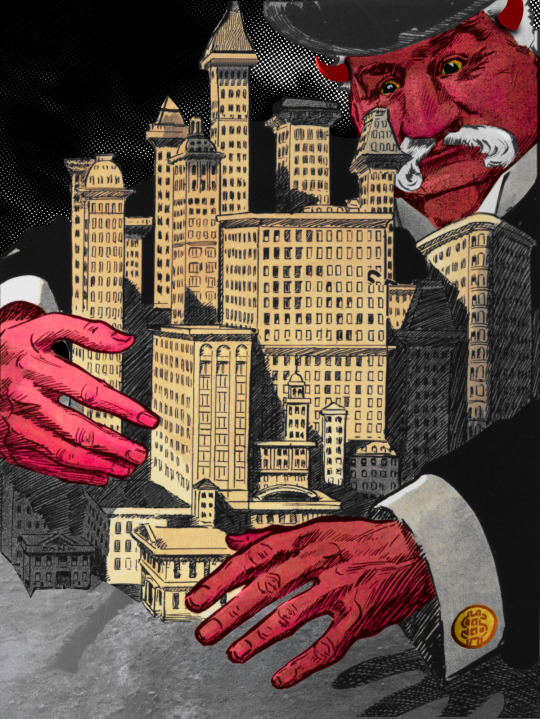
I'm coming to DEFCON! On FRIDAY (Aug 9), I'm emceeing the EFF POKER TOURNAMENT (noon at the Horseshoe Poker Room), and appearing on the BRICKED AND ABANDONED panel (5PM, LVCC - L1 - HW1–11–01). On SATURDAY (Aug 10), I'm giving a keynote called "DISENSHITTIFY OR DIE! How hackers can seize the means of computation and build a new, good internet that is hardened against our asshole bosses' insatiable horniness for enshittification" (noon, LVCC - L1 - HW1–11–01).

Here's an open secret: the confusing jargon of finance is not the product of some inherent complexity that requires a whole new vocabulary. Rather, finance-talk is all obfuscation, because if we called finance tactics by their plain-language names, it would be obvious that the sector exists to defraud the public and loot the real economy.
Take "leveraged buyout," a polite name for stealing a whole goddamned company:
Identify a company that owns valuable assets that are required for its continued operation, such as the real-estate occupied by its outlets, or even its lines of credit with suppliers;
Approach lenders (usually banks) and ask for money to buy the company, offering the company itself (which you don't own!) as collateral on the loan;
Offer some of those loaned funds to shareholders of the company and convince a key block of those shareholders (for example, executives with large stock grants, or speculators who've acquired large positions in the company, or people who've inherited shares from early investors but are disengaged from the operation of the firm) to demand that the company be sold to the looters;
Call a vote on selling the company at the promised price, counting on the fact that many investors will not participate in that vote (for example, the big index funds like Vanguard almost never vote on motions like this), which means that a minority of shareholders can force the sale;
Once you own the company, start to strip-mine its assets: sell its real-estate, start stiffing suppliers, fire masses of workers, all in the name of "repaying the debts" that you took on to buy the company.
This process has its own euphemistic jargon, for example, "rightsizing" for layoffs, or "introducing efficiencies" for stiffing suppliers or selling key assets and leasing them back. The looters – usually organized as private equity funds or hedge funds – will extract all the liquid capital – and give it to themselves as a "special dividend." Increasingly, there's also a "divi recap," which is a euphemism for borrowing even more money backed by the company's assets and then handing it to the private equity fund:
https://pluralistic.net/2020/09/17/divi-recaps/#graebers-ghost
If you're a Sopranos fan, this will all sound familiar, because when the (comparatively honest) mafia does this to a business, it's called a "bust-out":
https://en.wikipedia.org/wiki/Bust_Out
The mafia destroys businesses on a onesy-twosey, retail scale; but private equity and hedge funds do their plunder wholesale.
It's how they killed Red Lobster:
https://pluralistic.net/2024/05/23/spineless/#invertebrates
And it's what they did to hospitals:
https://pluralistic.net/2024/02/28/5000-bats/#charnel-house
It's what happened to nursing homes, Armark, private prisons, funeral homes, pet groomers, nursing homes, Toys R Us, The Olive Garden and Pet Smart:
https://pluralistic.net/2023/06/02/plunderers/#farben
It's what happened to the housing co-ops of Cooper Village, Texas energy giant TXU, Old Country Buffet, Harrah's and Caesar's:
https://pluralistic.net/2021/05/14/billionaire-class-solidarity/#club-deals
And it's what's slated to happen to 2.9m Boomer-owned US businesses employing 32m people, whose owners are nearing retirement:
https://pluralistic.net/2022/12/16/schumpeterian-terrorism/#deliberately-broken
Now, you can't demolish that much of the US productive economy without attracting some negative attention, so the looter spin-machine has perfected some talking points to hand-wave away the criticism that borrowing money using something you don't own as collateral in order to buy it and wreck it is obviously a dishonest (and potentially criminal) destructive practice.
The most common one is that borrowing money against an asset you don't own is just like getting a mortgage. This is such a badly flawed analogy that it is really a testament to the efficacy of the baffle-em-with-bullshit gambit to convince us all that we're too stupid to understand how finance works.
Sure: if I put an offer on your house, I will go to my credit union and ask the for a mortgage that uses your house as collateral. But the difference here is that you own your house, and the only way I can buy it – the only way I can actually get that mortgage – is if you agree to sell it to me.
Owner-occupied homes typically have uncomplicated ownership structures. Typically, they're owned by an individual or a couple. Sometimes they're the property of an estate that's divided up among multiple heirs, whose relationship is mediated by a will and a probate court. Title can be contested through a divorce, where disputes are settled by a divorce court. At the outer edge of complexity, you get things like polycules or lifelong roommates who've formed an LLC s they can own a house among several parties, but the LLC will have bylaws, and typically all those co-owners will be fully engaged in any sale process.
Leveraged buyouts don't target companies with simple ownership structures. They depend on firms whose equity is split among many parties, some of whom will be utterly disengaged from the firm's daily operations – say, the kids of an early employee who got a big stock grant but left before the company grew up. The looter needs to convince a few of these "owners" to force a vote on the acquisition, and then rely on the idea that many of the other shareholders will simply abstain from a vote. Asset managers are ubiquitous absentee owners who own large stakes in literally every major firm in the economy. The big funds – Vanguard, Blackrock, State Street – "buy the whole market" (a big share in every top-capitalized firm on a given stock exchange) and then seek to deliver returns equal to the overall performance of the market. If the market goes up by 5%, the index funds need to grow by 5%. If the market goes down by 5%, then so do those funds. The managers of those funds are trying to match the performance of the market, not improve on it (by voting on corporate governance decisions, say), or to beat it (by only buying stocks of companies they judge to be good bets):
https://pluralistic.net/2022/03/17/shareholder-socialism/#asset-manager-capitalism
Your family home is nothing like one of these companies. It doesn't have a bunch of minority shareholders who can force a vote, or a large block of disengaged "owners" who won't show up when that vote is called. There isn't a class of senior managers – Chief Kitchen Officer! – who have been granted large blocks of options that let them have a say in whether you will become homeless.
Now, there are homes that fit this description, and they're a fucking disaster. These are the "heirs property" homes, generally owned by the Black descendants of enslaved people who were given the proverbial 40 acres and a mule. Many prosperous majority Black settlements in the American South are composed of these kinds of lots.
Given the historical context – illiterate ex-slaves getting property as reparations or as reward for fighting with the Union Army – the titles for these lands are often muddy, with informal transfers from parents to kids sorted out with handshakes and not memorialized by hiring lawyers to update the deeds. This has created an irresistible opportunity for a certain kind of scammer, who will pull the deeds, hire genealogists to map the family trees of the original owners, and locate distant descendants with homeopathically small claims on the property. These descendants don't even know they own these claims, don't even know about these ancestors, and when they're offered a few thousand bucks for their claim, they naturally take it.
Now, armed with a claim on the property, the heirs property scammers force an auction of it, keeping the process under wraps until the last instant. If they're really lucky, they're the only bidder and they can buy the entire property for pennies on the dollar and then evict the family that has lived on it since Reconstruction. Sometimes, the family will get wind of the scam and show up to bid against the scammer, but the scammer has deep capital reserves and can easily win the auction, with the same result:
https://www.propublica.org/series/dispossessed
A similar outrage has been playing out for years in Hawai'i, where indigenous familial claims on ancestral lands have been diffused through descendants who don't even know they're co-owner of a place where their distant cousins have lived since pre-colonial times. These descendants are offered small sums to part with their stakes, which allows the speculator to force a sale and kick the indigenous Hawai'ians off their family lands so they can be turned into condos or hotels. Mark Zuckerberg used this "quiet title and partition" scam to dispossess hundreds of Hawai'ian families:
https://archive.is/g1YZ4
Heirs property and quiet title and partition are a much better analogy to a leveraged buyout than a mortgage is, because they're ways of stealing something valuable from people who depend on it and maintain it, and smashing it and selling it off.
Strip away all the jargon, and private equity is just another scam, albeit one with pretensions to respectability. Its practitioners are ripoff artists. You know the notorious "carried interest loophole" that politicians periodically discover and decry? "Carried interest" has nothing to do with the interest on a loan. The "carried interest" rule dates back to 16th century sea-captains, and it refers to the "interest" they had in the cargo they "carried":
https://pluralistic.net/2021/04/29/writers-must-be-paid/#carried-interest
Private equity managers are like sea captains in exactly the same way that leveraged buyouts are like mortgages: not at all.
And it's not like private equity is good to its investors: scams like "continuation funds" allow PE looters to steal all the money they made from strip mining valuable companies, so they show no profits on paper when it comes time to pay their investors:
https://pluralistic.net/2023/07/20/continuation-fraud/#buyout-groups
Those investors are just as bamboozled as we are, which is why they keep giving more money to PE funds. Today, the "dry powder" (uninvested money) that PE holds has reached an all-time record high of $2.62 trillion – money from pension funds and rich people and sovereign wealth funds, stockpiled in anticipation of buying and destroying even more profitable, productive, useful businesses:
https://www.institutionalinvestor.com/article/2di1vzgjcmzovkcea8f0g/portfolio/private-equitys-dry-powder-mountain-reaches-record-height
The practices of PE are crooked as hell, and it's only the fact that they use euphemisms and deceptive analogies to home mortgages that keeps them from being shut down. The more we strip away the bullshit, the faster we'll be able to kill this cancer, and the more of the real economy we'll be able to preserve.

If you'd like an essay-formatted version of this post to read or share, here's a link to it on pluralistic.net, my surveillance-free, ad-free, tracker-free blog:
https://pluralistic.net/2024/08/05/rugged-individuals/#misleading-by-analogy
#pluralistic#leveraged buyouts#lbos#divi recaps#mortgages#weaponized shelter#debt#finance#private equity#pe#mego#bust outs#plunder#looting
431 notes
·
View notes
Text
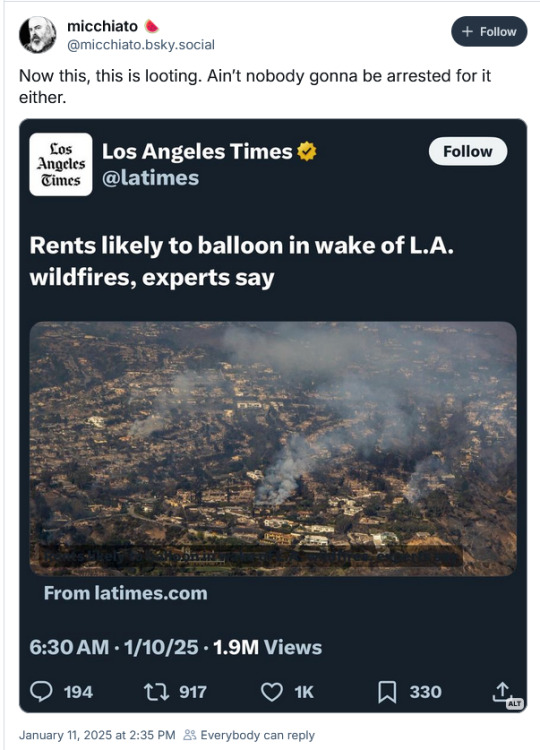
#twitter#tweet#tweets#la times#looting#wild fires#los angeles fires#california wildfires#california fires#wildfire#pacific palisades#bsky#price gouging
188 notes
·
View notes
Text
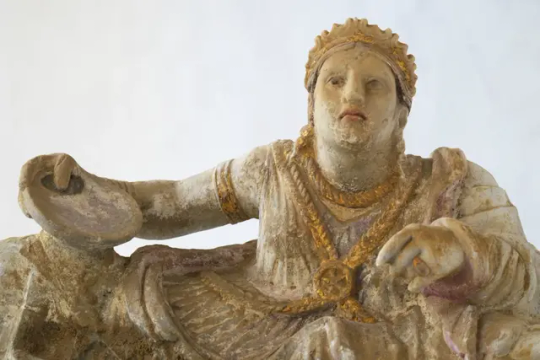
Italy Recovers Etruscan Artifacts Dug up by ‘Amateurish’ Tomb Raiders
Italian authorities have recovered precious 3rd century B.C. artifacts from an Etruscan necropolis looted by a couple of bungling tomb raiders in Umbria who stumbled across the haul on their land.
The Etruscans flourished in central Italy around 2,500 years ago but were gradually assimilated into the Roman empire. They left behind lavish tombs, pottery and statues but tantalizingly few written documents and patchy evidence of their daily lives.
The artifacts, including eight urns, two sarcophagi and beauty accessories such as bronze mirrors and a perfume bottle still redolent of its original scent, are worth at least 8 million euros ($8.5 million), Carabinieri art police said.
They were found in Citta della Pieve, about 150 kilometers (90 miles) north of Rome.
One sarcophagus contained the full skeleton of a woman in her 40s, while the urns were finely decorated with scenes from Greek mythology and female figures with still-visible red paint on their lips and gold coloring on their jewels.
Police seized the loot from two entrepreneurs who had unearthed Etruscan burial chambers while excavating land they owned, Perugia Chief Prosecutor Raffaele Cantone told a press conference on Tuesday.

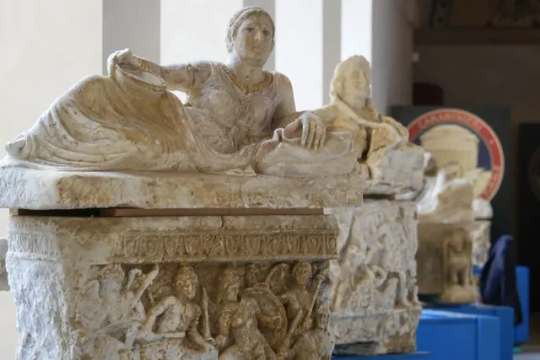
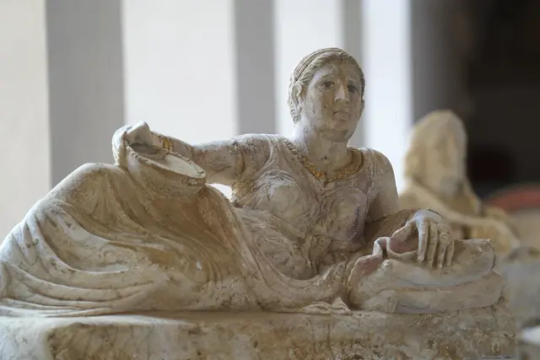
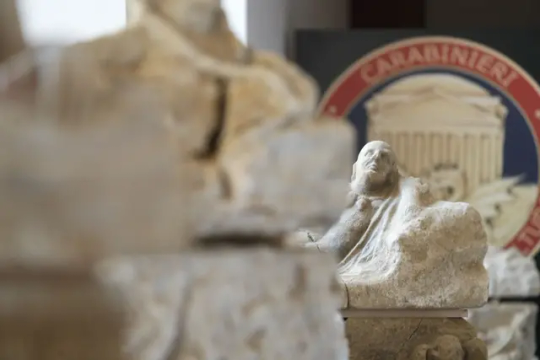
They “had nothing to do with the world of (practiced) tomb raiders” and were “clumsy” and “amateurish” in the way they tried to access the black market for looted art, the prosecutor said.
The Carabinieri caught up with them after they posted pictures of their discovery on the internet in the hope of finding buyers, triggering investigations that included phone wiretaps, stakeouts and air surveillance drones.
Police finally swooped on the suspects after one of them posted on Facebook a picture of himself with a looted artifact, Cantone said.
The pair face charges related to theft and trading in stolen goods, and risk jail sentences of up to 10 years, said prosecutor Annamaria Greco, who led the investigation.
Another Etruscan tomb, belonging to the same “Pulfna” family, was found in Città della Pieve in 2015. At the time, the farmer who made the discovery reported it to authorities and got about 100,000 euros ($105,000) as a reward.
Città della Pieve is close to San Casciano dei Bagni, a Tuscan village where a major archaeological discovery was announced in 2022, with ancient bronze statues found among the mud of thermal baths once used by Etruscans and Romans.
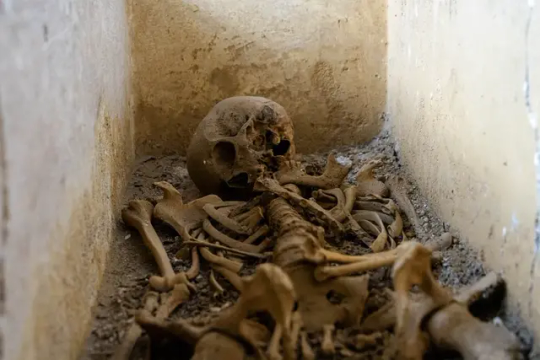
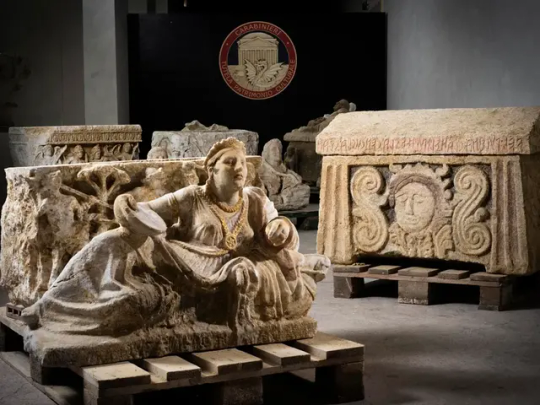
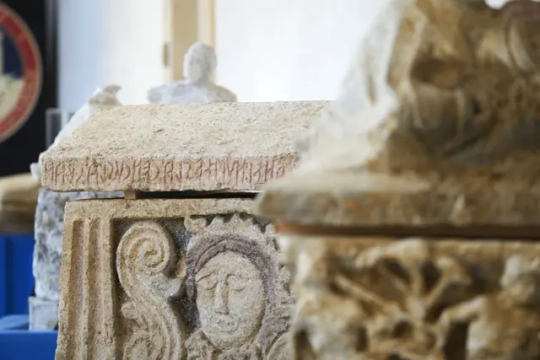
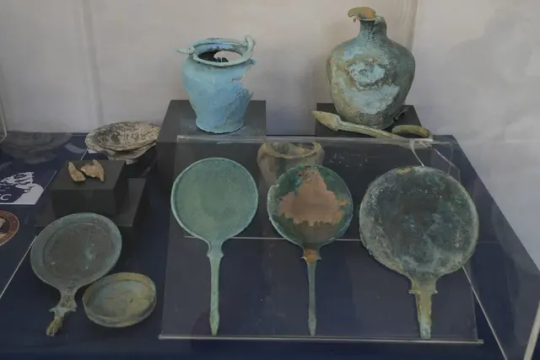
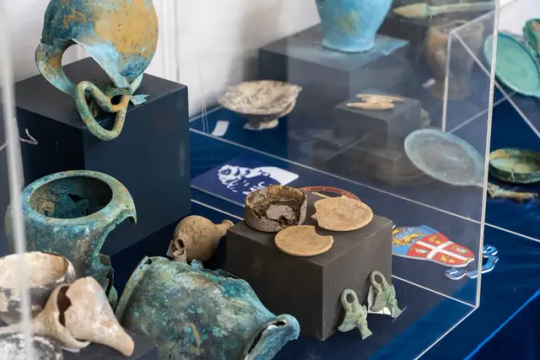
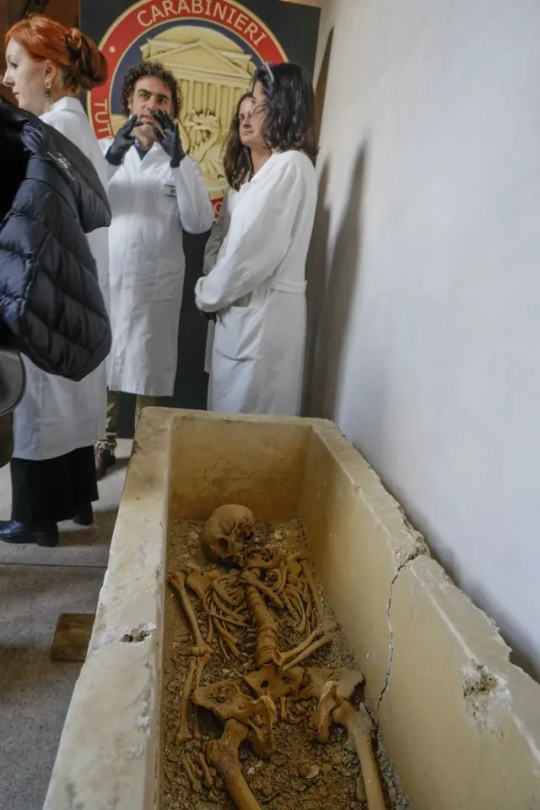

#Italy Recovers Etruscan Artifacts Dug up by ‘Amateurish’ Tomb Raiders#Citta della Piev#Etruscan necropolis#ancient tombs#ancient graves#tomb robbers#looting#stolen#ancient artifacts#archeology#archeolgst#history#history news#ancient history#ancient culture#ancient civilizations#roman history#roman empire#etruscan history#etruscan art#ancient art
165 notes
·
View notes
Text

White people deploy the idea of looting in a way that implies people of color are greedy and lazy, but it is just the opposite: looting is a hard-won and dangerous act with potentially terrible consequences, and looters are only stealing from the rich owners’ profit margins.
Those owners, meanwhile, especially if they own a chain like QuikTrip, steal forty hours every week from thousands of employees who in return get the privilege of not dying for another seven days.
— Vicky Osterweil, In Defense of Looting
359 notes
·
View notes
Text

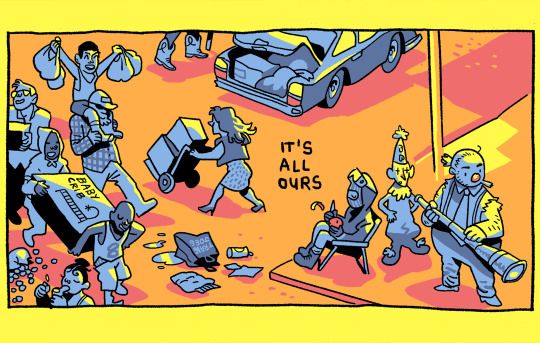

new age just dropped.
527 notes
·
View notes
Text

flower picking maniac
28 notes
·
View notes
Text
sam: oh its so sad that they died in what looks like a great fight
also sam: "begins looting" it's really sad guys
#cr spoilers#live blogging#critical role#age of umbra#we are so back#looting#8 shot spoilers#sam regiel
14 notes
·
View notes
Text
Sourdoire Valley Song
youtube
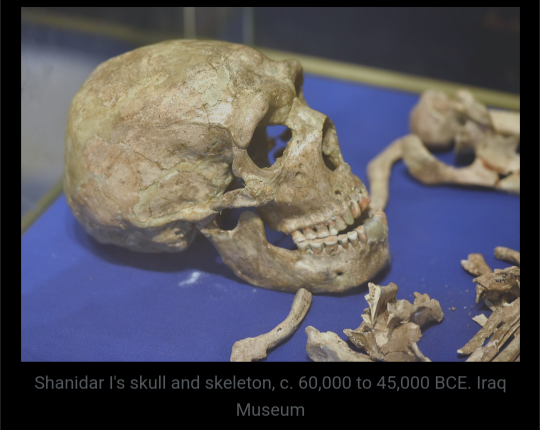


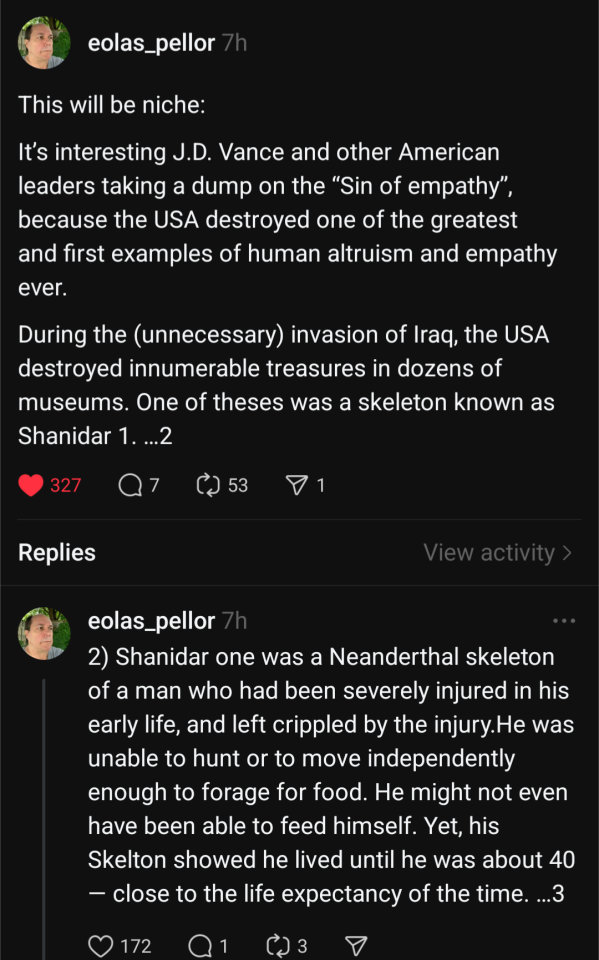
#sin of empathy#paleolithic#paleoanthropology#iraq war#operation iraqi freedom#looting#neanderthals#grave goods#the mountain goats#to mourn is human#christofascists#trump regime#vp couchfucker#fuck trump#Youtube
18 notes
·
View notes
Text
Playing Fallout New Vegas doing chaotic good because I stole from a dead guy clothes and all, so I traded with him instead. Not me, being actually just chaotic neutral, my reasoning totally wasn't that my backpack was overencumbered and I couldn't run anymore.
This is what I felt like
#New Vegas#Fallout#Fallout games#Fallout New vegas#courier six#I don't want to set the world on fire#Looting
17 notes
·
View notes
Text
When private equity destroys your hospital

I'm on tour with my new novel The Bezzle! Catch me TOMORROW in PHOENIX (Changing Hands, Feb 29) then Tucson (Mar 9-10), San Francisco (Mar 13), and more!

As someone who writes a lot of fiction about corporate crime, I naturally end up spending a lot of time being angry about corporate crime. It's pretty goddamned enraging. But the fiction writer in me is especially upset at how cartoonishly evil the perps are – routinely doing things that I couldn't ever get away with putting in a novel.
Beyond a doubt, the most cartoonishly evil characters are the private equity looters. And the most cartoonishly evil private equity looters are the ones who get involved in health care.
(Buckle up.)
Writing for The American Prospect, Maureen Tcacik details a national scandal: the collapse of PE-backed hospital chain Steward Health, a company that bought and looted hospitals up and down the country, starving them of everything from heart valves to prescription paper, ripping off suppliers, doctors and nurses, and callously exposing patients to deadly risk:
https://prospect.org/health/2024-02-27-scenes-from-bat-cave-steward-health-florida/
Steward occupies a very special place in the private equity looting cycle. Private equity companies arrange themselves on a continuum of indiscriminate depravity. At the start of the continuum are PE funds that buy productive and useful firms (everything from hospitals to car-washes) using "leveraged buyouts." That means that they borrow money to buy the company and use the company itself as collateral: it's like you getting a bank-loan to buy your neighbor's mortgage out from under them, and using your neighbor's house as collateral for that loan.
Once the buyout is done, the PE fund pays itself a "special dividend" (stealing money the business needs to survive) and then starts charging the business a "management fee" for the PE fund's expertise. To pay for all this, the PE bosses start to hack away at the company. Quality declines. So do wages. Prices go up. The company changes suppliers, opting for cheaper alternatives, often stiffing the old company. There are mass layoffs. The remaining employees end up doing three peoples' jobs, for lower wages, with fewer materials of lower quality.
Eventually, that top-feeding PE company finds a more desperate, more ham-fisted PE company to unload the business onto. That middle-feeding company also does a leveraged buyout, pays itself another special dividend, cuts wages, staffing and quality even further. They switch to even worse suppliers and stiff the last batch. Prices go up even higher.
Then – you guessed it – the middle-feeding PE company finds an even more awful PE bottom-feeder to unload the company onto. That bottom feeder does it all again, without even pretending to leave the business in condition to do its job. The company is a shambling zombie at this point, often producing literal garbage in place of the products that made its reputation. Employees' paychecks bounce, or don't show up at all. The company stops bothering to pay the lawyers that have been fending off its creditors. Those lawyers sue the company, too.
That's the kind of PE company Steward Health was, and, as the name suggests, Steward Health is in the business of stripping away the very last residue of value from community hospitals. As you might imagine, this gets pretty fucking ugly.
Steward owns 32 hospitals up and down the country, though its holdings are dwindling as the company walks away from its debt-burdened holdings, after years of neglect that have rendered them unfit for use as health facilities – or for any other purpose. Tcacik's piece offers a snapshot of one such hospital: Florida's Rockledge Regional Medical Center, just eight miles from Cape Canaveral.
Rockledge is a disaster. The fifth floor was, at one point, home to 5,000 bats.
Five.
Thousand.
Bats.
(Rockledge stiffed the exterminators.)
The bats were just the beginning. One of the internal sewage pipes ruptured. Whole sections of the hospital were literally full of shit, oozing out of the walls and ceiling, slopping over medical equipment.
That's an urgent situation for any hospital, but for Rockledge, it's catastrophic, because Rockledge is a hospital without any hospital supplies. Steward has stiffed the companies that supply "heart valves, urology lasers, Impella catheters, cardiac catheterization balloons, slings for lifting heavier patients, blood and urine test reagents, and most recently, prescription paper." Key medical equipment has been repossessed. So have the Pepsi machines. The hospital cafeteria had its supply of cold cuts repossessed:
https://www.reddit.com/r/massachusetts/comments/1agc1j4/comment/kolicqo/
It's not just Steward's nonpayments that reek of impending doom. Its payments also bear the hallmarks of a scam artist on the brink of blowing off the con. The company recently paid off a vendor with five separate checks for $1m, each drawn on "a random hospital in Utah" (Steward recently walked away from its Utah hospitals; its partners there are suing it for stealing $18m on their way out the door).
This company – which owns 32 hospitals! – has resorted to gambits like sending photos of fake checks to doctors it hasn't paid in months as "proof" that the money was coming (the checks arrived 22 days later).
Steward owes so much money to its employees – $1.66m to just one doctors' group. But the medical staff keep doing their jobs, and are reluctant to speak on the record, thanks to Steward's reputation for vicious retaliation. Those health workers keep showing up to take care of patients, even as the hospital crumbles around them. One clinician told Tcacik: "I watched a bed collapse underneath a [patient] who had just undergone hip surgery."
Rockledge has nine elevators, but only five of them work – the other four have been broken for a year. The hospital's fourth floor has been converted to "a graveyard of broken beds." The sinks are clogged, or filled with foul gunk. There's black mold. Nurses have noted on the maintenance tags that the repair service refuses to attend the hospital until their overdue bills are paid. The fifteen-person on-site maintenance team was cut to just two workers.
Steward is just the latest looting owner of Rockledge. After the Great Financial Crisis, private equity consultants helped sell it to Health Management Associates. The hospital's CEO took home a $10m bonus for that sale and exited; Health Management Associates then quickly became embroiled in a Medicare fraud and kickback scandal. Soon after, Rockledge was passed on to Community Health Systems, who then sold it on to Rockledge.
Steward, meanwhile, was at that time owned by an even bigger private equity giant, Cerberus, which then sold Steward off. That deal was performatively complex and hid all kinds of mischief. Prior to Cerberus's sell-off of Steward, they sold off Steward's real-estate. The buyer was Medical Properties Trust, who gave Cerberus $1.25b for the real-estate: three hospitals in Florida and three more in Ohio. Steward then contracted to operate these hospitals on MPT's behalf, and pay MPT rent for the real-estate.
This complex arrangement was key to siphoning value out of the hospital and to keeping angry creditors at bay – if you can't figure out who owes you money, it's a lot harder to collect on the debt. The scheme was masterminded by Steward founder/CEO Ralph de la Torre. De la Torre is notorious for taking a massive dividend out of the company while it owed $1.4b to its creditors. He bought a $40m yacht with the money.
De la Torre was once feted as a business genius who would "disrupt" healthcare. But as Steward's private jet hops around "Corfu, Santorini, St. Maarten and Antigua" as its hospitals literally crumble, he's becoming less popular. In Massachusetts, politicians have railed against Steward and de la Torre (Governor Healey wants the company to leave the state "as soon as possible").
Florida, by contrast, is much more friendly to Steward. The state Health and Human Services Committee chair Randy Fine is an ardent admirer of hospital privatization and is currently campaigning to sell off the last community hospital in Brevard County. The state inspectors are likewise remarkably tolerant of Steward's little peccadillos. The quasi-governmental agency that inspects hospitals has awarded this shit-and-bat-filled, elevator-free, understaffed rotting hulk "A" grades for quality.
These inspectors jointly represent a mismatched assortment of private and public agencies, dominated by a nonprofit called Leapfrog, the brainchild of Harvard public-health prof Lucian Leape, who founded it in 2000. Leapfrog likes to tout its "transparent" assessment criteria, and Steward are experts at hitting those criteria, spending the exact minimum to tick every box that Leapfrog inspectors use as proxies for overall quality and safety.
This is a pretty great example of Goodhart's Law: "every measurement eventually becomes a target, whereupon it ceases to be a good measurement":
https://xkcd.com/2899/
But despite Steward's increasingly furious creditors and its decaying facilities, the company remains bullish on its ability to continue operations. Medical Properties Trust – the real estate investment trust that is nominally a separate company from Steward – recently hosted a conference call to reassure Wall Street investors that it would be a going concern. When a Bank of America analyst asked MPT's CFO how this could possibly be, given the facility's dire condition and Steward's degraded state, the CFO blithely assured him that the company would get bailouts: "We own hospitals no one wants to see closed."
That's the thing about PE and health-care. The looters who buy out every health-care facility in a region understand that this makes them too big to fail: no matter how dangerous the companies they drain become, local governments will continue to prop them up. Look at dialysis, a market that's been cornered by private equity rollups. Today, if you need this lifesaving therapy, there's a good chance that every accessible facility is owned by a private equity fund that has fired all its qualified staff and ceased sterilizing its needles. Otherwise healthy people who visit these clinics sometimes die due to operator error. But they chug along, because no dialysis clinics is worse that "dialysis clinics where unqualified sadists sometimes kill you with dirty needles":
https://www.thebignewsletter.com/p/the-dirty-business-of-clean-blood
The bad news is that private equity has thoroughly colonized the entire medical system. They took hospitals, fired the doctors, then took over the doctors' groups that provided outsource staff to the hospital:
https://pluralistic.net/2020/04/04/a-mind-forever-voyaging/#prop-bets
It's illegal for private equity companies to own doctors' practices (doctors have to own these), but they obfuscated the crime with a paper-thin pretext that they got away with despite its obvious bullshittery:
https://pluralistic.net/2020/05/21/profitable-butchers/#looted
The financier who decides whether you live or die depends on an algorithm that literally sets a tolerable level of preventable deaths for the patients trapped in the practice:
https://pluralistic.net/2023/08/05/any-metric-becomes-a-target/#hca
Private equity also took over emergency rooms and boobytrapped them with "surprise billing" – junk fees that ran to thousands of dollars that you had to pay even if the hospital was in network with your insurer. They made billions from this, and spent a many millions from that booty keeping the scam alive with scare ads:
https://pluralistic.net/2020/04/21/all-in-it-together/#doctor-patient-unity
The whole health stack is colonized by private equity-backed monopolies. Even your hospital bed!
https://pluralistic.net/2022/01/05/hillrom/#baxter-international
Then there's residential care. Private equity cornered many regional markets on nursing homes and turned them into slaughterhouses, places where you go to die, not live:
https://pluralistic.net/2021/02/23/acceptable-losses/#disposable-olds
The palliative care sector is also captured by private equity. PE bosses hire vast teams of fast-talking salespeople who con vulnerable older people into entering an end-of-life system before they are ready to die. Thanks to loose regulation, the nation is filled with fake hospices that can rake in millions from Medicare while denying all care to their patients (hospice patients don't get life-extending medication or procedures, by definition):
https://pluralistic.net/2023/04/26/death-panels/#what-the-heck-is-going-on-with-CMS
If you survive this long enough, Medicare eventually tells the hospice that you're clearly not dying and you get kicked off their rolls. Now you have to go through the lengthy bureaucratic nightmare of convincing the system – which was previously informed that you were at death's door – that you are actually viable and need to start getting care again (good luck with that).
If that kills you, guess what? Private equity has rolled up funeral homes up and down the country, and they will scam your survivors just as hard as the medical system that killed you did:
https://pluralistic.net/2022/09/09/high-cost-of-dying/#memento-mori
The PE sector spent more than a trillion dollars over the past decade buying up healthcare companies, and it has trillions more in "dry powder" allocated for further medical acquisitions. Why not? As the CFO of Medical Properties Trust told that Bank of America analyst last week, when you "own hospitals no one wants to see closed." you literally can't fail, no matter how many people you murder.
The PE sector is a reminder that the crimes people commit for money far outstrip the crimes they commit for ideology. Even the most ideological killers are horrified by the murders their profit-motivated colleagues commit.
Last year, Tkacic wrote about the history of IG Farben, the German company that built Monowitz, a private slave-labor camp up the road from Auschwitz to make the materiel it was gouging Hitler's Wehrmacht on:
https://pluralistic.net/2023/06/02/plunderers/#farben
Farben bought the cheapest possible slaves from Auschwitz, preferentially sourcing women and children. These slaves were worked to death at a rate that put Auschwitz's wholesale murder in the shade. Farben's slaves died an average of just three months after starting work at Monowitz. The situation was so abominable, so unconscionable, that the SS officers who provided outsource guard-labor to Monowitz actually wrote to Berlin to complain about the cruelty.
The Nuremberg trials are famous for the Nazi officers who insisted that they were "just following order" but were nonetheless executed for their crimes. 24 Farben executives were also tried at Nuremberg, where they offered a very different defense: "We had a fiduciary duty to our shareholders to maximize our profits." 19 of the 24 were acquitted on that basis.
PE is committed to an ideology that is far worse than any form of racial animus or other bias. As a sector, it is committed to profit above all other values. As a result, its brutality knows no bounds, no decency, no compassion. Even the worst crimes we commit for hate are nothing compared to the crimes we commit for greed.

If you'd like an essay-formatted version of this post to read or share, here's a link to it on pluralistic.net, my surveillance-free, ad-free, tracker-free blog:
https://pluralistic.net/2024/02/28/5000-bats/retaliation#charnel-house
#pluralistic#Rockledge Regional Medical Center#private equity#looting#Steward Health#ponzis#maureen tcacik#Medical Properties Trust#Ralph de la Torre#Massachusetts#florida#Cerberus#too big to fail#pe#guillotine watch
342 notes
·
View notes
Text
Philadelphia looting is completely out of control. 🤔
#pay attention#educate yourselves#educate yourself#knowledge is power#reeducate yourself#reeducate yourselves#think for yourselves#think about it#think for yourself#do your homework#do some research#do your own research#ask yourself questions#question everything#news#philadelphia#looting#lawlessness
225 notes
·
View notes
Text
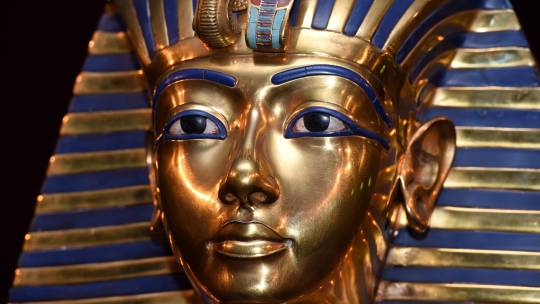
Discover the Hidden History of Tomb Robbing in Ancient Egypt
Criminals plundered the riches of Egyptian pyramids and underground burials, often within a few years or, in some cases, within a few hours of occupants’ interment.
On November 4, 1922, workers led by British archaeologist Howard Carter noticed a single stair peeking out from beneath the shifting Egyptian sand. Within three weeks, Carter and his team had excavated enough limestone debris and soil to reveal a stairwell that led to the antechamber of an ancient tomb.
After five long years of searching, Carter had found the tomb of Tutankhamun, deep beneath the Valley of the Kings, a site west of the Nile River. Boring a tiny hole in the second door to the antechamber, the archaeologist peered through, using the light of a single candle to survey a small room crammed with a motley mix of furniture, gilded animal heads and dismantled chariots, as well as other priceless treasures last seen more than 3,000 years prior.
The 18th Dynasty ruler’s tomb was the single most consequential discovery of Egyptian antiquities to date; its importance lay not just in the treasures hidden inside, but in the fact that the burial had somehow survived the robbers who had emptied out nearly every other ancient Egyptian tomb. Only a few royal graves rival Tutankhamun’s in splendor. Chief among them is the intact tomb of Psusennes I, known as the Silver Pharaoh because of the silver coffin that housed his mummy.
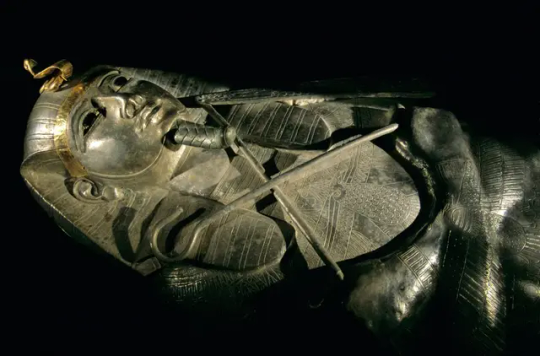
The silver coffin of Psusennes I.
In an ancient society with a stark separation between the rich and the poor, tomb robbing was ubiquitous. Nobles literally buried their wealth while living alongside people who often didn’t have enough food to feed their families. Plundering burials was a shadow economy driven by criminals who often had inside knowledge of the tombs. It’s likely that many looters either helped build the structures themselves or paid off someone involved in the tombs’ construction, says Betsy M. Bryan, an emeritus Egyptologist at Johns Hopkins University.
Some grave robbers were stonecutters and craftsmen who left gaps in tombs’ walls or knew which bedrock was soft enough to tunnel through to reach the treasures housed within. Others schemed to evade or pay off security left to guard the tombs. These thieves were well connected, calculating and decidedly precise in their criminal endeavors, Bryan says.
“Evidence from the Old, Middle and New Kingdom[s] shows that tomb robbers could be remarkably patient and work over lengthy time periods to create tunnels into tombs that they thought would be rich [with treasures],” she says.

Aboveground structures like the Step Pyramid of Djoser were natural targets for tomb robbers.
Looting happened consistently throughout the history of ancient Egypt, but it was most prevalent during the First and Second Intermediate Periods, which followed the Old and Middle Kingdoms, respectively. Without a strong ruler in place, power became decentralized, and the state had less money to protect its graves. The end of the New Kingdom also ushered in a period of corruption and uncertainty that resulted in widespread tomb robbing.
Officials took a range of steps to prevent tomb robbing, like carving curses on doors to scare would-be looters away. Some tombs, like the pyramid complex of Djoser, were filled with debris to block passage to the burial chambers. During the New Kingdom (circa 1550 to 1070 B.C.E.), sovereigns were buried underground instead of in aboveground pyramids. Workers tasked with building these hidden tombs lived in Deir el-Medina, a village near the Valley of the Kings. Though the isolated, close-knit nature of the community was intended to lower the likelihood of theft, it ultimately had the opposite effect, encouraging looting by the very people assigned to protect the dead.
Workers tasked with sealing tombs had the best access to the treasures hidden within. They were often the last ones out, so no one was the wiser if they ransacked the tombs they’d been hired to protect, says Aidan Dodson, an Egyptologist at the University of Bristol in England. Sometimes, the burials would appear untouched, but once the coffin was opened, the golden mask that once adorned the pharaoh’s face would be missing.
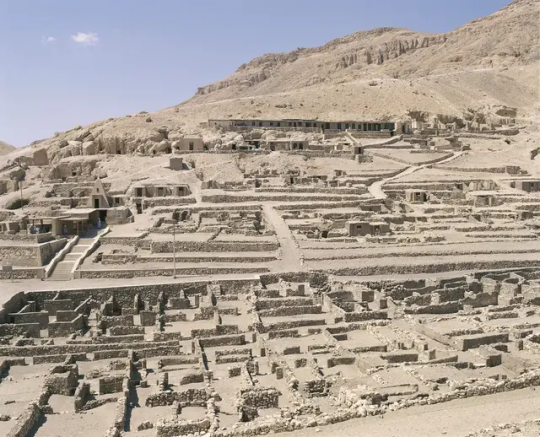
Ruins of Deir el-Medina, a village occupied by the workers who built the tombs in the Valley of the Kings.
In other cases, when a mummy was unwrapped, the jewelry that had been placed inside was gone, stolen by the undertakers who’d prepared the dead for burial, Dodson says. He adds, “Resin was used in embalming, and there would be places on the body where there was an impression of a piece of jewelry that was no longer there.”
When the tomb of Nefermaat, an ancient Egyptian prince, was uncovered in 1871 at Meidum, archaeologists at first thought it was intact, sealed up tight for 4,000 years. But once inside the burial chamber, the scene was chaotic. “Everything was smashed to pieces,” Dodson says. “It had been robbed [and] the mummy broken.”
After a heist, ancient tomb robbers moved on to the next phase of the crime: trafficking their stolen goods in exchange for payment. This, too, required forethought. Getting caught bartering the mask of a pharaoh, for example, would have been cause for execution by impalement on a stake. To avoid this fate, criminals went after treasures that couldn’t be traced, like gold and other precious metals that could be melted down without buyers knowing their origin. In some cases, robbers would steal highly valuable perfumed oils to sell on the international market. Thieves also burned gilded furniture and statues to remove the gold that once adorned them, Dodson says.

Papyrus Mayer B, a legal document detailing the trials of tomb robbers during Egypt's 20th Dynasty.
Historical evidence of tomb robbing comes primarily from a set of papyri detailing trials that took place in Thebes during the New Kingdom, specifically the 20th Dynasty, which spanned 1189 to 1077 B.C.E. The legal documents provide a window into the individuals who carried out the robberies directly, who knowingly fenced looted treasures or who ferried thieves across the Nile to sell their sacred finds, Bryan says.
“We took our copper tools and forced a way into the pyramid of this king through its innermost part,” said a mason named Amenpanufer in a confession dated to around 1110 B.C.E. After stripping the royal mummies of their gold, amulets and jewels, Amenpanufer and his fellow thieves “set fire to their coffins [and] stole their furniture.” The robbers then divided the tomb’s spoils among themselves.
The papyri point to a time when the state was in turmoil, says Salima Ikram, an Egyptologist at the American University in Cairo. Rampant tomb looting coincided with a period of unrest, famine, outside attacks and constant transitions in power.
“In the 20th Dynasty when we have a lot of royal tomb robbery, the state couldn’t provide, and that’s why people were taking matters into their own hands,” says Ikram.
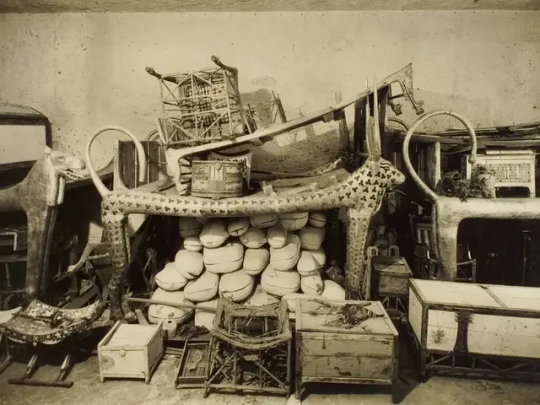
Tutankhamun's tomb was one of the few royal Egyptian burials left largely untouched by ancient looters.
Still, tomb robbing wasn’t confined to times of unrest. Even Tutankhamun, who ruled during the 18th Dynasty (approximately 1550 to 1292 B.C.E.), when Egyptian civilization was at its peak, was the victim of theft. Inside the antechamber of the king’s tomb, Carter’s team found bags of abandoned loot. According to Dodson, the thieves appeared to have been caught in the act and forced to leave their ill-gotten goods behind.
Tomb robbing was one of the worst crimes an ancient Egyptian could commit, as tombs were considered sacred vehicles that provided passage to the afterlife. “Elite society was geared toward eternal life,” says Maria Golia, author of A Short History of Tomb-Raiding: The Epic Hunt for Egypt’s Treasures. Nobles were mummified and packed in a tomb with their belongings, all of them necessities, because “the afterlife was viewed as an extension of their current life,” Golia explains.
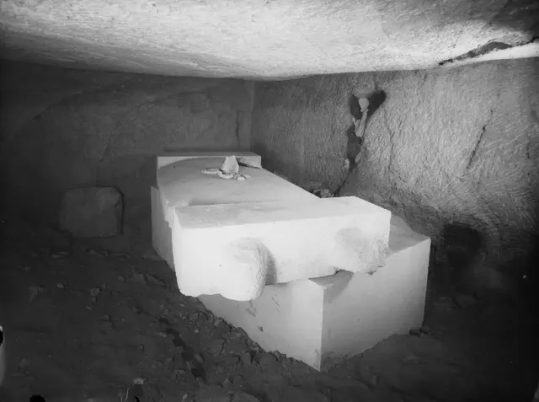
The white limestone sarcophagus of Nefermaat, whose tomb was looted by robbers.
Destruction of a tomb was, in a sense, a form of murder—a fact reflected in the brutality of documented punishments, Ikram says. Some accused criminals had their hands cut off, while others were impaled, a form of execution where a stake was inserted into the anus, perforating the body all the way up to the torso.
No matter the punishment, noble tombs remained ripe for theft throughout ancient Egypt’s 3,000-year history—and beyond. After the civilization fell into decline, thievery gave way to treasure hunting, with residents of the region no longer revering Egyptian religion or fearing the curses of the dead, says Dodson. Stealing from tombs was hardly considered a crime anymore. By the late 19th century, seizing such riches was a government-sanctioned practice, with archaeologists excavating tombs in the name of science.
In an ancient world marked by haves and have-nots, loot tucked inside pyramids and buried underground presented an opportunity for an irresistible crime, especially as the once-great Egyptian empire lost power. What was formerly sacred was now a means for feeding a family, Golia says.
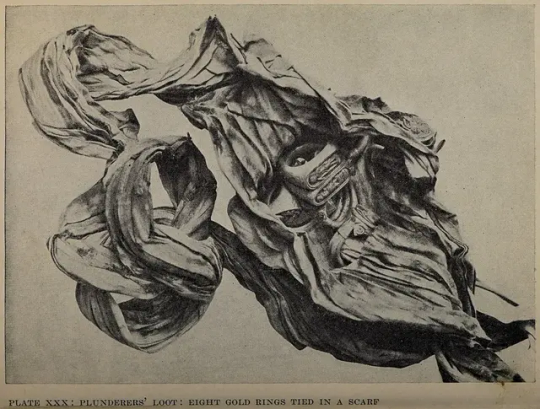
Plunderers' loot found in King Tut's tomb.
“This was a system built on burying money, even entire households, underground,” she says, “and while the architects only had one shot at building an impenetrable tomb, the robbers had all the time in the world to figure out how to get in.”
By Sarah Novak.
#Discover the Hidden History of Tomb Robbing in Ancient Egypt#howard carter#tomb#ancient tomb#tomb robbery#grave#ancient grave#grave robbery#treasure#looting#ancient artifacts#archeology#archeolgst#history#history news#ancient history#ancient culture#ancient civilizations#ancient egypt#egyptian history#egyptian art#egyptian pharaoh#long post#long reads
54 notes
·
View notes
Text
A familiar playbook...
"You can wipe out an entire generation, you can burn their homes to the ground and somehow they'll still find their way back. But if you destroy their history, you destroy their achievements and it's as if they never existed. That's what Hitler wants and that's exactly what we are fighting for." ~ Frank Stokes, The Monuments Men
Legal experts and historians claim Russia intentionally targets artistic and cultural sites as a way to eradicate Ukrainian identity.
12 notes
·
View notes
